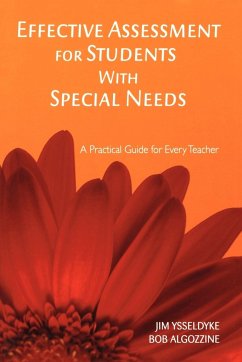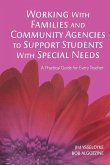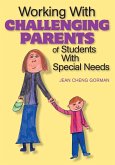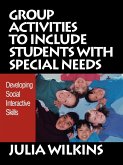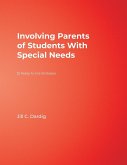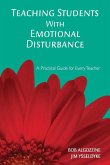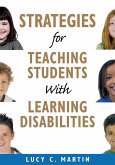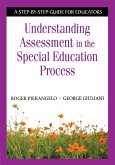James E. Ysseldyke, Bob Algozzine, Robert Algozzine
Effective Assessment for Students with Special Needs
A Practical Guide for Every Teacher
James E. Ysseldyke, Bob Algozzine, Robert Algozzine
Effective Assessment for Students with Special Needs
A Practical Guide for Every Teacher
- Broschiertes Buch
- Merkliste
- Auf die Merkliste
- Bewerten Bewerten
- Teilen
- Produkt teilen
- Produkterinnerung
- Produkterinnerung
When determining whether or not a student should receive special education services, what the specific nature of the student's instruction should be, or the extent to which a student is making educational progress, it is critical to know not only what sort of assessment method is most appropriate, but how, when, and where it should be administered. Including a pre-test, post-test, and key vocabulary terms, Effective Assessment for Students With Special Needs helps educators make these weighty decisions with highly practical information such as: o Formal and informal methods of data collection…mehr
Andere Kunden interessierten sich auch für
![Working With Families and Community Agencies to Support Students With Special Needs Working With Families and Community Agencies to Support Students With Special Needs]() Jim YsseldykeWorking With Families and Community Agencies to Support Students With Special Needs29,99 €
Jim YsseldykeWorking With Families and Community Agencies to Support Students With Special Needs29,99 €![Working With Challenging Parents of Students With Special Needs Working With Challenging Parents of Students With Special Needs]() Jean Cheng GormanWorking With Challenging Parents of Students With Special Needs41,99 €
Jean Cheng GormanWorking With Challenging Parents of Students With Special Needs41,99 €![Group Activities to Include Students with Special Needs Group Activities to Include Students with Special Needs]() Julia WilkinsGroup Activities to Include Students with Special Needs45,99 €
Julia WilkinsGroup Activities to Include Students with Special Needs45,99 €![Involving Parents of Students With Special Needs Involving Parents of Students With Special Needs]() Jill C. DardigInvolving Parents of Students With Special Needs43,99 €
Jill C. DardigInvolving Parents of Students With Special Needs43,99 €![Teaching Students With Emotional Disturbance Teaching Students With Emotional Disturbance]() Bob AlgozzineTeaching Students With Emotional Disturbance29,99 €
Bob AlgozzineTeaching Students With Emotional Disturbance29,99 €![Strategies for Teaching Students with Learning Disabilities Strategies for Teaching Students with Learning Disabilities]() Lucy C. MartinStrategies for Teaching Students with Learning Disabilities40,99 €
Lucy C. MartinStrategies for Teaching Students with Learning Disabilities40,99 €![Understanding Assessment in the Special Education Process Understanding Assessment in the Special Education Process]() Roger PierangeloUnderstanding Assessment in the Special Education Process33,99 €
Roger PierangeloUnderstanding Assessment in the Special Education Process33,99 €-
-
-
When determining whether or not a student should receive special education services, what the specific nature of the student's instruction should be, or the extent to which a student is making educational progress, it is critical to know not only what sort of assessment method is most appropriate, but how, when, and where it should be administered. Including a pre-test, post-test, and key vocabulary terms, Effective Assessment for Students With Special Needs helps educators make these weighty decisions with highly practical information such as: o Formal and informal methods of data collection o When to use various assessment practices and what they can show an evaluator o Standards for conducting assessments to ensure accuracy o Using data to make decisions about the education of students with disabilities and those who are gifted and talented
Hinweis: Dieser Artikel kann nur an eine deutsche Lieferadresse ausgeliefert werden.
Hinweis: Dieser Artikel kann nur an eine deutsche Lieferadresse ausgeliefert werden.
Produktdetails
- Produktdetails
- Verlag: Corwin
- Seitenzahl: 144
- Erscheinungstermin: 1. März 2006
- Englisch
- Abmessung: 229mm x 152mm x 8mm
- Gewicht: 220g
- ISBN-13: 9781412938969
- ISBN-10: 1412938961
- Artikelnr.: 21385367
- Herstellerkennzeichnung
- Produktsicherheitsverantwortliche/r
- Europaallee 1
- 36244 Bad Hersfeld
- gpsr@libri.de
- Verlag: Corwin
- Seitenzahl: 144
- Erscheinungstermin: 1. März 2006
- Englisch
- Abmessung: 229mm x 152mm x 8mm
- Gewicht: 220g
- ISBN-13: 9781412938969
- ISBN-10: 1412938961
- Artikelnr.: 21385367
- Herstellerkennzeichnung
- Produktsicherheitsverantwortliche/r
- Europaallee 1
- 36244 Bad Hersfeld
- gpsr@libri.de
Jim Ysseldyke, Ph.D., is Birkmaier Professor in the Department of Educational Psychology, director of the School Psychology Program, and director of the Center for Reading Research at the University of Minnesota. Widely requested as a staff developer and conference speaker, Ysseldyke brings more than 30 years of research and teaching experience to educational professionals around the globe. As the former director of the federally funded National Center on Educational Outcomes, Ysseldyke conducted research and provided technical support that helped to boost the academic performance of students with disabilities and improve school assessment techniques nationally. Today, he continues to work to improve the education of students with disabilities. The author of more than 300 publications on special education and school psychology, Ysseldyke is best known for his textbooks on assessment, effective instruction, issues in special education, and other cutting-edge areas of education and school psychology. With A Practical Approach to Special Education for Every Teacher, Ysseldyke seeks to equip educators with practical knowledge and methods that will help them to better engage students in exploring-and meeting-all their potentials.
About A Practical Approach to Special Education for Every Teacher
Acknowledgements
About the Authors
Self-Assessment I
Introduction to Effective Assessment for Students With Special Needs
1. What Should Every Teacher Know About Assessment for Decision-Making
Purposes?
Screening Decisions
Decisions to Provide Special Help or Enrichment
Referral to an Intervention Assistance Team
Decisions to Provide Intervention Assistance
Decisions to Refer for Evaluation
Exceptionality Decisions
Decisions About Special Learning Needs
Decisions About Eligibility or Entitlement
Instructional Planning Decisions
Progress Evaluation Decisions
Program Evaluation Decisions
Accountability Decisions
2. What Are the Most Common Assessment Practices?
Curriculum-Based Assessment
Curriculum-Based Measurement
Instructional Diagnosis
Academic Time Analysis
Assessment of Instructional Environments
Outcomes-Based Accountability
Performance Assessment
3. How Is Assessment Data Collected?
Methods for Collecting Data
Tests
Observations
Interviews
Work Portfolios
4. Which Methods of Assessment Should Be Use to Sample Certain Behaviors
and Abilities?
Intellectual Ability
Academic Achievement
Sensory Acuity
Adaptive Behavior
Language Development
Psychological Development
Perceptual-Motor Development
5. What Standards Must Be Met To Ensure the Accuracy of an Assessment?
Reliability: Is Performance Consistent?
Representativeness: Does the Instrument Adequately Sample the Behavior?
Validity: Does a Procedure Measure What it is Supposed to Measure?
6. What Concerns Do Parents, Students, and the General Public Have About
Assessments?
Test Fairness
Acceptability
Consequences
7. What Are the Assumptions Underlying Assessment Practices?
The Examiner is Skilled
Future Behavior Can Be Inferred From Present Behavior
Assessment Is Relatively Free From Error
Students Have Comparable Acculturation
8. What Guidelines Should Be Followed for Appropriate Assessment?
There Is No One Way To Do It Right
There Is No One Cause of School Problems
Assessment Must Do More Than Describe Problems
Assessment Must Be Directed At Improving Instruction
Assessment Should Occur Often During Teaching
Assessment Should Concentrate on Relevant Variables
Assessment Should Occur Where The Behavior Occurs
Tests Should Be Adapted To Accommodate Students
9. Assessment in Perspective
Assessment in the Classroom
The Effects of Assessment
10. What Have We Learned?
Key Points
Key Vocabulary
Self-Assessment II
Answer Key for Self-Assessments
On Your Own
Resources
Books
Journals & Articles
Organizations
References
Index
Acknowledgements
About the Authors
Self-Assessment I
Introduction to Effective Assessment for Students With Special Needs
1. What Should Every Teacher Know About Assessment for Decision-Making
Purposes?
Screening Decisions
Decisions to Provide Special Help or Enrichment
Referral to an Intervention Assistance Team
Decisions to Provide Intervention Assistance
Decisions to Refer for Evaluation
Exceptionality Decisions
Decisions About Special Learning Needs
Decisions About Eligibility or Entitlement
Instructional Planning Decisions
Progress Evaluation Decisions
Program Evaluation Decisions
Accountability Decisions
2. What Are the Most Common Assessment Practices?
Curriculum-Based Assessment
Curriculum-Based Measurement
Instructional Diagnosis
Academic Time Analysis
Assessment of Instructional Environments
Outcomes-Based Accountability
Performance Assessment
3. How Is Assessment Data Collected?
Methods for Collecting Data
Tests
Observations
Interviews
Work Portfolios
4. Which Methods of Assessment Should Be Use to Sample Certain Behaviors
and Abilities?
Intellectual Ability
Academic Achievement
Sensory Acuity
Adaptive Behavior
Language Development
Psychological Development
Perceptual-Motor Development
5. What Standards Must Be Met To Ensure the Accuracy of an Assessment?
Reliability: Is Performance Consistent?
Representativeness: Does the Instrument Adequately Sample the Behavior?
Validity: Does a Procedure Measure What it is Supposed to Measure?
6. What Concerns Do Parents, Students, and the General Public Have About
Assessments?
Test Fairness
Acceptability
Consequences
7. What Are the Assumptions Underlying Assessment Practices?
The Examiner is Skilled
Future Behavior Can Be Inferred From Present Behavior
Assessment Is Relatively Free From Error
Students Have Comparable Acculturation
8. What Guidelines Should Be Followed for Appropriate Assessment?
There Is No One Way To Do It Right
There Is No One Cause of School Problems
Assessment Must Do More Than Describe Problems
Assessment Must Be Directed At Improving Instruction
Assessment Should Occur Often During Teaching
Assessment Should Concentrate on Relevant Variables
Assessment Should Occur Where The Behavior Occurs
Tests Should Be Adapted To Accommodate Students
9. Assessment in Perspective
Assessment in the Classroom
The Effects of Assessment
10. What Have We Learned?
Key Points
Key Vocabulary
Self-Assessment II
Answer Key for Self-Assessments
On Your Own
Resources
Books
Journals & Articles
Organizations
References
Index
About A Practical Approach to Special Education for Every Teacher
Acknowledgements
About the Authors
Self-Assessment I
Introduction to Effective Assessment for Students With Special Needs
1. What Should Every Teacher Know About Assessment for Decision-Making
Purposes?
Screening Decisions
Decisions to Provide Special Help or Enrichment
Referral to an Intervention Assistance Team
Decisions to Provide Intervention Assistance
Decisions to Refer for Evaluation
Exceptionality Decisions
Decisions About Special Learning Needs
Decisions About Eligibility or Entitlement
Instructional Planning Decisions
Progress Evaluation Decisions
Program Evaluation Decisions
Accountability Decisions
2. What Are the Most Common Assessment Practices?
Curriculum-Based Assessment
Curriculum-Based Measurement
Instructional Diagnosis
Academic Time Analysis
Assessment of Instructional Environments
Outcomes-Based Accountability
Performance Assessment
3. How Is Assessment Data Collected?
Methods for Collecting Data
Tests
Observations
Interviews
Work Portfolios
4. Which Methods of Assessment Should Be Use to Sample Certain Behaviors
and Abilities?
Intellectual Ability
Academic Achievement
Sensory Acuity
Adaptive Behavior
Language Development
Psychological Development
Perceptual-Motor Development
5. What Standards Must Be Met To Ensure the Accuracy of an Assessment?
Reliability: Is Performance Consistent?
Representativeness: Does the Instrument Adequately Sample the Behavior?
Validity: Does a Procedure Measure What it is Supposed to Measure?
6. What Concerns Do Parents, Students, and the General Public Have About
Assessments?
Test Fairness
Acceptability
Consequences
7. What Are the Assumptions Underlying Assessment Practices?
The Examiner is Skilled
Future Behavior Can Be Inferred From Present Behavior
Assessment Is Relatively Free From Error
Students Have Comparable Acculturation
8. What Guidelines Should Be Followed for Appropriate Assessment?
There Is No One Way To Do It Right
There Is No One Cause of School Problems
Assessment Must Do More Than Describe Problems
Assessment Must Be Directed At Improving Instruction
Assessment Should Occur Often During Teaching
Assessment Should Concentrate on Relevant Variables
Assessment Should Occur Where The Behavior Occurs
Tests Should Be Adapted To Accommodate Students
9. Assessment in Perspective
Assessment in the Classroom
The Effects of Assessment
10. What Have We Learned?
Key Points
Key Vocabulary
Self-Assessment II
Answer Key for Self-Assessments
On Your Own
Resources
Books
Journals & Articles
Organizations
References
Index
Acknowledgements
About the Authors
Self-Assessment I
Introduction to Effective Assessment for Students With Special Needs
1. What Should Every Teacher Know About Assessment for Decision-Making
Purposes?
Screening Decisions
Decisions to Provide Special Help or Enrichment
Referral to an Intervention Assistance Team
Decisions to Provide Intervention Assistance
Decisions to Refer for Evaluation
Exceptionality Decisions
Decisions About Special Learning Needs
Decisions About Eligibility or Entitlement
Instructional Planning Decisions
Progress Evaluation Decisions
Program Evaluation Decisions
Accountability Decisions
2. What Are the Most Common Assessment Practices?
Curriculum-Based Assessment
Curriculum-Based Measurement
Instructional Diagnosis
Academic Time Analysis
Assessment of Instructional Environments
Outcomes-Based Accountability
Performance Assessment
3. How Is Assessment Data Collected?
Methods for Collecting Data
Tests
Observations
Interviews
Work Portfolios
4. Which Methods of Assessment Should Be Use to Sample Certain Behaviors
and Abilities?
Intellectual Ability
Academic Achievement
Sensory Acuity
Adaptive Behavior
Language Development
Psychological Development
Perceptual-Motor Development
5. What Standards Must Be Met To Ensure the Accuracy of an Assessment?
Reliability: Is Performance Consistent?
Representativeness: Does the Instrument Adequately Sample the Behavior?
Validity: Does a Procedure Measure What it is Supposed to Measure?
6. What Concerns Do Parents, Students, and the General Public Have About
Assessments?
Test Fairness
Acceptability
Consequences
7. What Are the Assumptions Underlying Assessment Practices?
The Examiner is Skilled
Future Behavior Can Be Inferred From Present Behavior
Assessment Is Relatively Free From Error
Students Have Comparable Acculturation
8. What Guidelines Should Be Followed for Appropriate Assessment?
There Is No One Way To Do It Right
There Is No One Cause of School Problems
Assessment Must Do More Than Describe Problems
Assessment Must Be Directed At Improving Instruction
Assessment Should Occur Often During Teaching
Assessment Should Concentrate on Relevant Variables
Assessment Should Occur Where The Behavior Occurs
Tests Should Be Adapted To Accommodate Students
9. Assessment in Perspective
Assessment in the Classroom
The Effects of Assessment
10. What Have We Learned?
Key Points
Key Vocabulary
Self-Assessment II
Answer Key for Self-Assessments
On Your Own
Resources
Books
Journals & Articles
Organizations
References
Index

